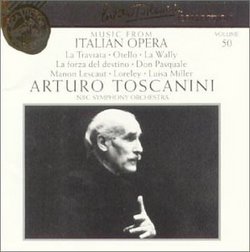| All Artists: Toscanini, NBC Title: Music From Italian Operas Members Wishing: 0 Total Copies: 0 Label: RCA Release Date: 6/9/1992 Genre: Classical Styles: Opera & Classical Vocal, Historical Periods, Classical (c.1770-1830) Number of Discs: 1 SwapaCD Credits: 1 UPC: 090266030927 |
Search - Toscanini, NBC :: Music From Italian Operas
 | Toscanini, NBC Music From Italian Operas Genre: Classical
|
Larger Image |
CD Details |
CD ReviewsItalian Operatic Gems Robert E. Nylund | Ft. Wayne, Indiana United States | 02/17/2006 (5 out of 5 stars) "It is a particular delight to hear the great care and effort that Arturo Toscanini (1867-1957) put into his performances of music from Italian operas. All but one of these operas were composed by Italian composers; the Austrian-born Mozart composed his opera "Don Giovanni" in Italian because that was the fashion at the time.
The Mozart overture that begins this disc is a particularly intense, dramatic performance from an NBC broadcast in Studio 8-H. It is probably one of the most powerful recordings of this familiar music, fully capturing the tragic elements of the doomed Don Juan, whom Mozart saw as much a victim as the women he seduced (although some have suggested that the Don was actually looking for the perfect or ideal woman). The opera has its comic moments, of course, but the overall drama of the story is a major part of the overture, one of the more mature works that Mozart composed. It is remarkable that the 1952 Carnegie Hall recording of the overture to Donizetti's comic opera "Don Paquale" is almost of the same duration as his 1920 recording with the Scala Orchestra (one of his very first recordings, made in Camden, New Jersey, for the Victor Talking Machine Company). Both recordings have incredible intensity and energy. They are truly delightful, too. "Passo a sei" is a short dance sequence from Rossini's final opera, "William Tell." Toscanini recorded it, along with Verdi and Rossini overtures, in Carnegie Hall in 1945. These recordings were apparently made with RCA Victor's experimental soundtrack recording system in which a magnetic strip (much like magnetic tape) was used to record a full-range, static-free recording. The performance is energetic and passionate. Alfredo Catalani was a close personal friend of the Maestro. At a time when most conductors were no longer playing Catalani's music, Toscanini continued to conduct a few "gems" the composer had written for his operas, including the prelude to Act IV of "La Wally" and the "Dance of the Water Nymphs" from "Loreley." Years ago I heard a recording of a rehearsal of the dance, in which Toscanini went into one of his classic furies when the NBC Symphony began to play the music as if it were a waltz. "This is not a waltz!" he scolded them, continuing with some Italian invective as he tried to convince the musicians that the music must be played with greater precision. He definitely succeeded. The overtures to Verdi's operas "Luisa Miller," "I Vespri Siciliani," and "La Forza del Destino" were all staples of Toscanini's repertoire. The performances have astonishing energy and drive, surpassing the interpretations of most other conductors. Much like Sir Thomas Beecham, Toscanini was said to have "an inner vision" of the music and he usually convinced his musicians to play with their hearts. The Maestro brought out the full range of emotions in Verdi's music and could point to his friendship with the composer, who gave his approval to what Toscanini was trying to accomplish. The preludes to Acts I and III of Verdi's "La Traviata" are especially poignant, quietly depicting the suffering of Violetta and her eventual tragic fate. The brilliant use of strings in this moving music is especially apparent in Toscanini's recordings with the NBC Symphony. A special treat is the seldom-heard ballet music Verdi composed in 1894 for a French production of his late opera "Otello." Taken from an NBC broadcast, Toscanini's performance is at times mysterious and haunting and at other times filled with relentless energy and joy. Sadly, an earlier release of this wonderful recording on the RCA Victrola label was badly distorted, probably because Toscanini insisted on a wide range of dynamics. This release, however, fully captures the truly high fidelity qualities present in this remarkable performance. " |

 Track Listings (12) - Disc #1
Track Listings (12) - Disc #1